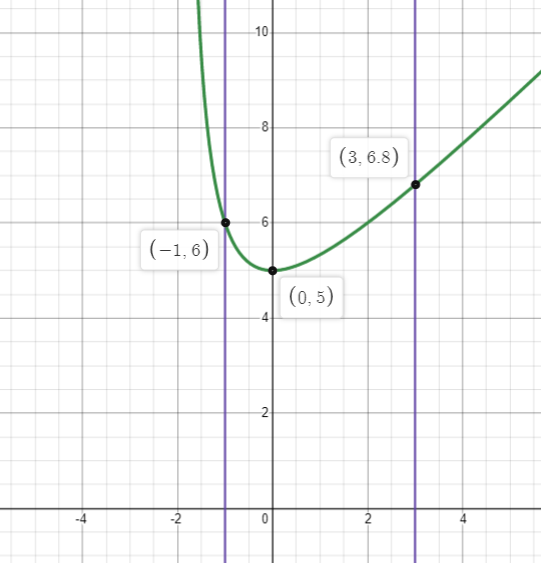
How do you use the Extreme Value Theorem to determine the global extrema of the function \[f(x) = 5 + \dfrac{{{x^2}}}{{x + 2}}\]on the closed interval \[\left[ { - 1,3} \right]\]\[?\]
Answer
525.3k+ views
Hint: First find the first derivative of the given function and equate it to zero to find the critical points. Consider the end points of the given interval. Find the value of the given function at each critical point and end points. The least of these values is the minimum and the greatest is the maximum.
Formula used:
Differentiation formula $\dfrac{u}{v}$ form: $\dfrac{d}{dx}(\dfrac{u}{v})=\dfrac{u’v-v’u}{v^2}$
Complete step by step solution:
The Extreme value theorem states that if a function is continuous on a closed interval \[\left[ {a,b} \right]\], then the function must have a maximum and a minimum on the interval \[\left[ {a,b} \right]\].
Given \[f(x) = 5 + \dfrac{{{x^2}}}{{x + 2}}\]---(1)
Differentiating with respect to \[x\] both sides of the equation (1), we get
\[\dfrac{{df}}{{dx}} = 0 + \left[ {\dfrac{{2x(x + 2) - {x^2}}}{{{{\left( {x + 2} \right)}^2}}}} \right] = \dfrac{{{x^2} + 4x}}{{{{\left( {x + 2} \right)}^2}}}\]---(2)
Equating the equation (2) to zero to find the critical points, we get
\[{x^2} + 4x = 0\]
\[ \Rightarrow \]\[x = 0, - 4\]
Since \[ - 4 \notin \left[ { - 1,3} \right]\]
\[ \Rightarrow \]\[x = 0\]
And consider the endpoints of the closed interval \[\left[ { - 1,3} \right]\].i.e., \[ - 1\] and \[3\].
Finding the values of the given function \[f\] at each critical point and end points. We get
\[f(0) = 5,\]\[f( - 1) = 5 + 1 = 6\] and \[f(3) = 5 + \dfrac{9}{5} = 6.8\]
Hence, from the above values. The maximum value and minimum value of the given function are \[6.8\] and \[5\] respectively.
The graph of the function is:
(Note that the graph is in the whole range, observe the critical points in the range of [-1,3] as marked on the graph).

Note:
Note that a function is continuous if you can draw its graph without lifting the pencil. Maximum value and minimum value of the given function is also known as absolute maxima and absolute minima respectively.
Formula used:
Differentiation formula $\dfrac{u}{v}$ form: $\dfrac{d}{dx}(\dfrac{u}{v})=\dfrac{u’v-v’u}{v^2}$
Complete step by step solution:
The Extreme value theorem states that if a function is continuous on a closed interval \[\left[ {a,b} \right]\], then the function must have a maximum and a minimum on the interval \[\left[ {a,b} \right]\].
Given \[f(x) = 5 + \dfrac{{{x^2}}}{{x + 2}}\]---(1)
Differentiating with respect to \[x\] both sides of the equation (1), we get
\[\dfrac{{df}}{{dx}} = 0 + \left[ {\dfrac{{2x(x + 2) - {x^2}}}{{{{\left( {x + 2} \right)}^2}}}} \right] = \dfrac{{{x^2} + 4x}}{{{{\left( {x + 2} \right)}^2}}}\]---(2)
Equating the equation (2) to zero to find the critical points, we get
\[{x^2} + 4x = 0\]
\[ \Rightarrow \]\[x = 0, - 4\]
Since \[ - 4 \notin \left[ { - 1,3} \right]\]
\[ \Rightarrow \]\[x = 0\]
And consider the endpoints of the closed interval \[\left[ { - 1,3} \right]\].i.e., \[ - 1\] and \[3\].
Finding the values of the given function \[f\] at each critical point and end points. We get
\[f(0) = 5,\]\[f( - 1) = 5 + 1 = 6\] and \[f(3) = 5 + \dfrac{9}{5} = 6.8\]
Hence, from the above values. The maximum value and minimum value of the given function are \[6.8\] and \[5\] respectively.
The graph of the function is:
(Note that the graph is in the whole range, observe the critical points in the range of [-1,3] as marked on the graph).

Note:
Note that a function is continuous if you can draw its graph without lifting the pencil. Maximum value and minimum value of the given function is also known as absolute maxima and absolute minima respectively.
Recently Updated Pages
Master Class 12 Economics: Engaging Questions & Answers for Success

Master Class 12 Physics: Engaging Questions & Answers for Success

Master Class 12 English: Engaging Questions & Answers for Success

Master Class 12 Social Science: Engaging Questions & Answers for Success

Master Class 12 Maths: Engaging Questions & Answers for Success

Master Class 12 Business Studies: Engaging Questions & Answers for Success

Trending doubts
Which are the Top 10 Largest Countries of the World?

What are the major means of transport Explain each class 12 social science CBSE

Draw a labelled sketch of the human eye class 12 physics CBSE

Why cannot DNA pass through cell membranes class 12 biology CBSE

Differentiate between insitu conservation and exsitu class 12 biology CBSE

Draw a neat and well labeled diagram of TS of ovary class 12 biology CBSE




